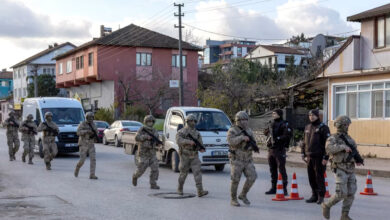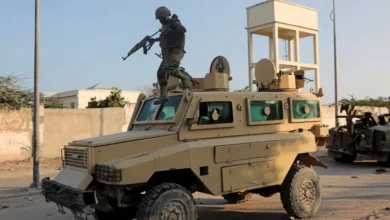ISTANBUL, Turkey – In a move that signifies the deep rift that continues to exist between the civilian government and military apparatus in Turkey, the country’s top military brass resigned from their posts late last week. The decision, analysts say, is emblematic of the recent erosion of the military’s power in favor of the democratically elected government in Ankara.
Chief of General Staff Işık Koşaner, Land Forces Commander General Ceylanoğlu, Air Force Commander General Hasan Aksay, and Naval Forces Commander Admiral Eşref Uğur Yiğit all entered early retirement in protest over the ongoing arrests and investigation of senior military officers linked to an alleged coup plot.
Gendarmarie Forces Commander Necdet Özel is the sole military commander to retain his title. Shortly after the resignations of his colleagues, government officials named Özel acting chief of general staff. He is expected to be confirmed after a four-day meeting of the Supreme Military Council (YAŞ) concludes on Thursday.
There are currently 195 military officers, both retired and active duty, implicated in the 2003 coup plot, dubbed “Sledgehammer”. Former Chief of General Staff Kosaner denounced the investigation, in a public statement following his resignation, as an impingement on the rights of military personnel.
“It has become impossible for me to continue in this office because I am unable to fulfill my responsibility to protect the rights of my personnel as the chief of general staff,” Koşaner said. “It is impossible to accept their detention as being in line with principles of universal law, justice and moral values.”
Deputy Chairman of the ruling Justice and Development Party (AKP), Hüseyin Tanrıverdi, claimed the resignations are “part of the process of democratization of Turkey,” in an apparent attempt to assuage the concerns of the Turkish people and international community.
Critics of AKP support the commanders' decision to protest, but are concerned that the absence of these military commanders will allow Prime Minister Recep Tayyip Erdoğan to tighten his grip on power. AKP supporters, on the other hand, are pleased with the resignations. The move, they say, represents a positive sign for Turkish democracy.
And analysts such as Berna Turam, researcher on Turkish and Middle Eastern democracy and associate professor at Northeast University in the US, argue the recent development plays a central role in the umbrella discussion of Turkish democratic development.
“This is not about who is going to win,” said Turam. “We must see these interactions as central aspects of democratization.”
Turkey has a history of military intervention in politics, with four successful coups in the past five decades. The military ousted civilian leaders in 1960, 1971, 1980 and 1997. The 1980 coup leaders drafted the constitution, introduced in 1982, that currently governs Turkey.
Since claiming power, Erdoğan's pro-Islamic AKP has prioritized replacing the 1982 document with a constitution created through democratic means. In a constitutional referendum in September 2010, the general public voted 58 percent in favor of revising the constitution. One issue set for revision that has proven particularly contentious provides the leaders of the 1980 coup with blanket immunity from prosecution.
After receiving a decisive majority in June’s general elections, AKP is expected to push its vision for a new constitution in the new parliament.
The AKP has also led the campaign to diminish the importance of the military’s weekly National Security Council meetings. In the past, military officials convened to define the agenda of the premiership.
The military, in its non-violent 1997 takeover that academics labeled a “postmodern coup”, deposed leaders of the only other openly Islamic party to gain power in Turkey’s 88-year history. Prime minister and head of the Welfare Party Necmettin Erbakan, who governed in a coalition with the True Path Party, was forced to step down.
The AKP is the only party in Turkish history that has proven strong enough to openly confront the military establishment and continue governing.
In 2007 Turkish secularists demonstrated en masse in response to the candidacy of Abdullah Gül, the previous AKP prime minister, for president. After a legal row, Gül was confirmed as the first devout Muslim president in Turkish history. High-ranking military officers, investigations later revealed, engineered the protests. This incident, according to Northeast’s Turam, ushered in a new era of military-civilian relations in Turkey.
“2007 marks the end of constructive relations between the military and AKP because of the military warning given to AKP against the nomination of Abdullah Gul for the presidency,” Turam said.
In Turkish politics, the president holds the power to veto laws passed by parliament. Prior to the confirmation of current president Gül, the position of president was viewed as a check on the perceived Islamist agenda of AKP, now in its third term in power.
“The military's response…was also an unthoughtful and unhelpful response that has caused a lot of fear of ongoing military hegemony in Turkish politics,” said Turam. “That fear is shared by both Turkish society and Western audiences.”
The public’s trust in the military, analysts say, has waned since the 2007 attempt to obstruct Gül’s ascendance to the presidency. The majority of the Turkish press, however, remains openly sympathetic with the protesting officers.
The resignations of former Chief of General Staff Koşaner and his colleagues seem to indicate the AKP has come out on top in the protracted struggle with the military establishment. But, analysts such as Turam warn, the abrupt shift in leadership may jeopardize the very democratization AKP claims to seek.
“Disagreement is valuable as long as it is contained within the parameters of a stable political system but any plummeting or interruption in these mutual negotiations is a barrier to further conversation about political reform,” Turam said.
The resignations also come at a time when Erdoğan is reformulating the government's approach to confronting the guerilla Kurdistan Workers' Party (PKK) in southeastern Turkey. The three-decade-long Kurdish conflict has left roughly 40,000 people killed. Erdoğan plans to train a new counter-terrorism police force to take over the military's role in confronting the rebels.
In a resurgence of violence in the past few weeks, the PKK is suspected in separate attacks that have left 20 Turkish soldiers and 10 rebels killed.




